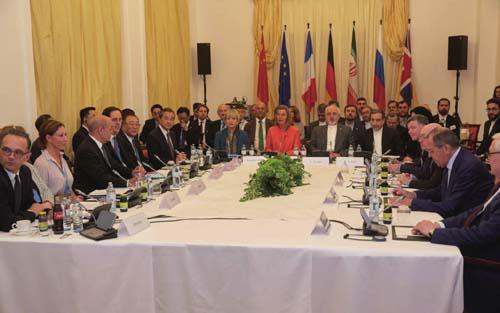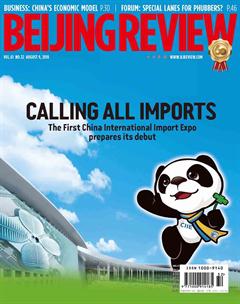Fighting Sanctions
By Wang Jin

As Washingtons deadline for the withdrawal of foreign investment from Iran approaches, U.S. President Donald Trump looks set to reimpose punitive sanctions on both Iran and foreign companies which continue to do business in the Iranian market. A series of challenges, both internal and external, may destabilize Iran.
Trumps plan
The Iran nuclear deal was an important foundation in the settlement of the Iran nuclear issue. On July 14, 2015, the P5+1, made up of China, France, the United States, Russia, the UK and Germany, along with the European Union (EU), reached the Joint Comprehensive Plan of Action (JCPOA) with Iran to ensure that its nuclear program would be strictly non-military in nature. But less than two years later, in May 2018, Trump declared Washingtons intent to withdraw from the deal, with hostility between Iran and the United States escalating ever since.
According to Trump, the JCPOA is fl awed in several ways and needs reworking. Firstly, the deal is largely temporary, and most of the restrictions it imposes on Irans nuclear research and development activities will expire in 2030. Trump therefore thinks it is necessary to establish a new set of rules to permanently remove the possibility of Irans future development of nuclear weapons. Secondly, the deal does not, according to Trump, do enough to restrict Irans ambition of developing its own missile program and expanding its influence within the Middle East. Since the deal was signed in 2015, Iran has tested various missiles while its Islamic Revolutionary Guards have been involved in confl icts in Yemen and Syria.
Trumps decision to withdraw from the JCPOA is a serious blow to the values of the international community and the political reputation of Iranian President Hassan Rouhani. For the Rouhani administration, which assumed power in 2014, the nuclear deal was an important opportunity to integrate Iran into the international community following decades of isolation under U.S. sanctions and gain wider public support at home. Many Iranians also believed that the deal might help improve Irans economy, which deteriorated during the tenure of Rouhanis predecessor, Mahmoud Ahmadinejad.
Limited options
For Iran, Washingtons withdrawal deals a significant setback to the countrys economic prospects and has come as a disappointment to many Iranians. At home, the Iranian Government has faced a series of protests and demonstrations since the end of last year. These protests came primarily as a result of economic hardship, with some protestors calling for an end to theocratic rule, withdrawal from Syria and suspension of investment and economic assistance to Irans allies in the Middle East, such as Syria, Hezbollah in Lebanon and Hamas in Gaza.
These ongoing challenges have also prompted a shift in Irans domestic political landscape. Many conservatives and hardliners in Iran are blaming the Rouhani administration for the U.S. treachery and are threatening to quit the JCPOA as a counterattack to Washingtons upcoming sanctions. For the Iranian opposition, Trumps withdrawal from the JCPOA means an important opportunity to regain domestic support, challenge the current government and potentially demand its resignation.
There are two measures Iran could take to counter U.S. sanctions. It could threaten to restart its nuclear research and development program so as to force Washington and its allies in the Middle East to accept its demands to lift sanctions. Iran could also affect international oil prices by increasing its oil exports so as to disrupt Saudi Arabias plan to alleviate its own fi nancial burdens by increasing international oil prices.
Yet even these moves could ultimately prove futile. An attempt by Iran to restart its nuclear facilities may provoke the ire of countries in the EU, especially France, Germany and the UK. Although these nations do not agree with Trumps withdrawal and proposed sanctions, this does not necessarily mean that they would merely stand aside while Iran restarts its nuclear facilities. Any move by Iran to reinitiate its nuclear development program would distance it from the EU and seriously affect their already strained diplomatic relations.
An attempt to increase the production and export of oil could be blocked by Washingtons punitive measures. Iran has been looking for ways to continue exporting oil ever since the Trump administration threatened to impose sanctions on Tehrans business partners if they failed to cut their imports of Iranian oil to zero by November 4, in an attempt to further isolate Iran both politically and economically.
The only solution
Under growing pressure from the United States, many European fi rms once interested in investing in Irans markets have already begun to withdraw, while India, the second biggest buyer of Iranian oil after China, has told refi neries to prepare for a “drastic reduction” of Iranian oil imports to protect itself from Washingtons sanctions. It therefore looks unlikely that Iran will be able to counterattack the United States effectively in the short term through economic and fi nancial means.
Trumps decision to withdraw from the JCPOA and reimpose sanctions against Iran could be followed by new proposals for a deal with Iran. This plan is not unlike the Trump administrations strategy with the Democratic Peoples Republic of Korea and Syria, which is to force competitors to accept new terms through negotiations and dialogue following a series of penalties. Trumps tactics on Iran might be to bring Iran back to the negotiating table to accept new terms more favorable to Washington after months of severe sanctions.
It has been widely reported that during the United Nations General Assembly in September 2017, Trump proposed a direct meeting with Rouhani and the Iranian delegation through French diplomats, but this approach was ignored. Trump now hopes that harsher measures can force Iran into accepting new terms. These new conditions may include not only the suspension of Irans nuclear ambitions, but also the cessation of its involvement in Syria, Lebanon and Yemen, and the termination of its missile research and development program.
Yet this approach was attempted under the administration of former U.S. President Barack Obama. The sanctions designed jointly by the United States and Europe infl icted economic damage which forced Iran to suspend its nuclear program and sign the nuclear deal in 2015 under the countrys new moderate Rouhani. Such a plan might not work a second time. Rouhanis original signing of the JCPOA was met with major criticism at home. Trumps withdrawal from the agreement incited anger among the Iranian public, not only toward Washington, but toward Rouhani and the moderate bloc in the country as well. It will be far more difficult for any Iranian leader to do business with the United States again, even more so following the economic hardships ahead.
Irans main goal after the U.S. withdrawal from the JCPOA is to preserve international consensus for maintaining the deal and to continue to attract investment from Europe, Russia and Asia in spite of U.S. pressure. Given the limited options at Irans disposal to launch an effective counterattack and U.S. unwillingness to directly confront Iran on the battlefi eld, the only way out for the governments of both countries is to return to the negotiating table and find a solution that everyone can agree on.

